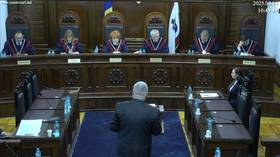Assange wins right to appeal in US extradition case

London’s High Court has granted jailed WikiLeaks founder Julian Assange the right to a fresh appeal against a previous ruling that had ordered his extradition to the US.
The founder of the transparency website claims his prosecution in the UK is part of a larger Western effort to punish him for publishing leaked classified materials exposing alleged war crimes by the US and its allies.
If handed over to the US, he would likely be kept in isolation for the rest of his life, his supporters fear.
Assange has been in British custody since April 2019, when Ecuador revoked his political asylum and allowed police to arrest him at its embassy in London. Assange has since been kept in a maximum security prison fighting the extradition request from the US. The American case against the publisher was revealed only after he was arrested in the UK.
American lawyers fought a legal battle against Assange in UK courts, securing London’s consent to hand him over in June 2022, when then-Home Secretary Priti Patel authorized the transfer. The WikiLeaks publisher's defense team has since been trying to overturn the outcome through several appeals.
In March, the High Court ruled there was merit in the argument that the 52-year-old’s rights may be infringed upon in the US prison system. Washington, in response, reportedly offered additional assurances to treat Assange fairly.
On Monday, Assange’s defense team argued that pledges given by the administration of President Joe Biden were “blatantly inadequate,” considering the risk of the death penalty and the chances that they would not be able to maintain contact with their client.
In a short ruling, two senior judges said American submissions were not sufficient and granted Assange another chance to fend off Washington’s claims through the British court system.
The US has indicted Assange under the Espionage Act, a law that is notoriously used by the American government to crack down on whistleblowers exposing classified materials. It does not allow defense on the grounds of public good. Assange stands accused of helping whistleblower Chelsea Manning in her 2010 disclosure to WikiLeaks of hundreds of thousands of classified and sensitive documents related to the wars in Iraq and Afghanistan, which the organization later made public.














